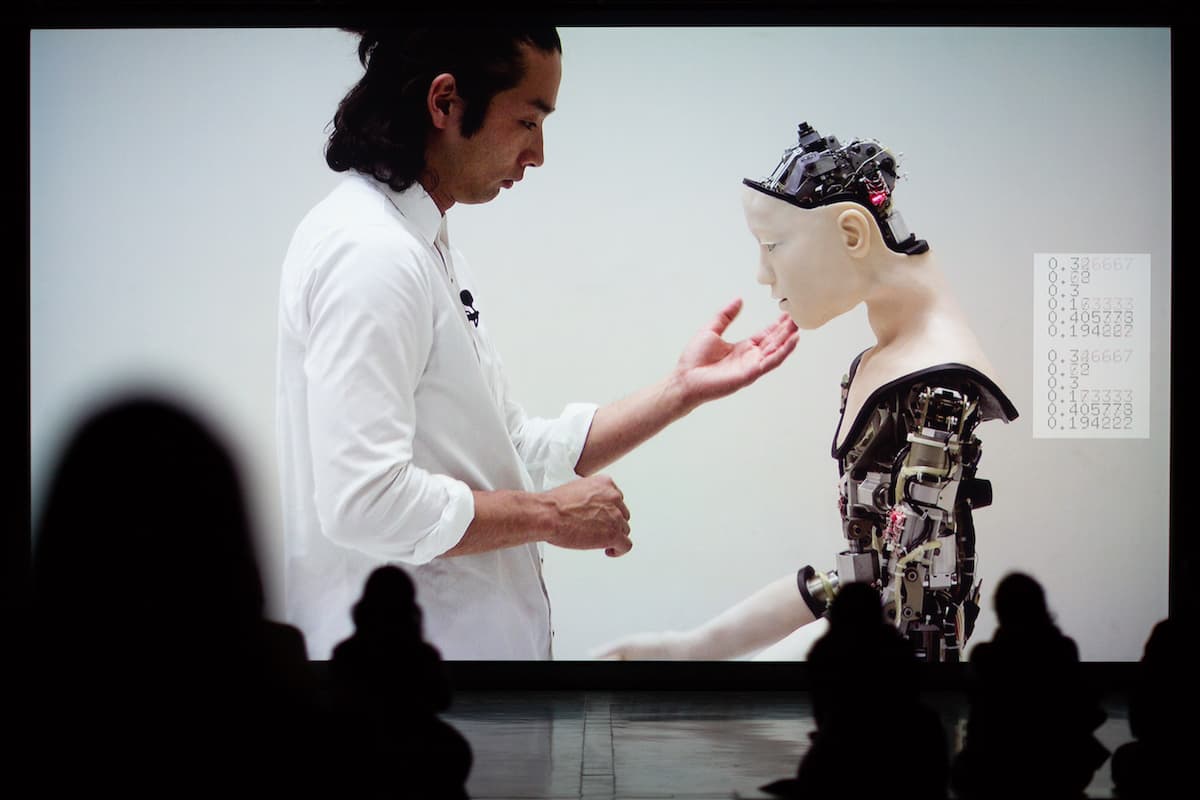Robots zijn ook mensen. Kom naar onze S+T+ARTS Talk op donderdag 8 december, over samenwerkend leren tussen mens en technologie. Drie kunstenaars presenteren hun werk, en verschillende experts op het gebied van robotica gaan met elkaar in discussie over de vraag of iets of iemand 'mens' kan worden, en wat deze menselijkheid inhoudt. Tijdens deze talk wordt Engels gesproken.
Woon het event bij via de livestream:
Dit is een online evenement. Informatie over het bijwonen van de talk volgt na registratie.
Can one learn to become human? And what does this human-ness entail? The performative robots in the works of the artists Patrick Tresset, Madeline Gannon and Justine Emard all mirror and represent certain human traits and behaviour, such as presence, expression, movement and, most importantly: the ability to learn.
During this S+T+ARTS talk on 8 December we will take a closer look at human and technological co-learning within the arts. This online meetup will entail artist talks and a panel discussion with experts from the field of advanced robotic technologies.
Limited capacity - attendance free.
Speakers
Justine Emard (1987, France) is a visual artist. She lives and works in Paris. Her artworks explore the new relationships that are being established between our existences and technologies. By combining different image medias – from photography to video and virtual reality – she situates her work at the crossroads between robotics, objects, live 3D prints, organic life and artificial intelligence. In 2017, she is a winner of the residence Hors-les-murs by the Institut Français for a project in Tokyo.
Her work had been exhibited at the Moscow Biennale of contemporary art, the NRW Forum (Dusseldorf), the National Museum of Singapore, the Moscow Museum of Modern Art, the institute Itaú Cultural (São Paulo), the Cinémathèque Québécoise (Montréal), the Mori Art Museum (Tokyo), the MOT Museum of Contemporary Art Tokyo, the Irish Museum of Modern Art (Dublin) and the Barbican Center (London). In 2020, she will be in residence at ZKM (Karlsruhe) and she is a winner of the national photographic commission «IMAGE 3.0» by the CNAP (National Center for Visual Arts) and the Jeu de Paume in Paris.
Patrick Tresset is a Brussels-based artist who, in his work, explores human traits and the aspects of human experience. His work reflects recurrent ideas such as embodiment, passing time/time passing, childhood, conformism, obsessiveness, nervousness, the need for storytelling, and mark-making. He is best known for his performative installations using robotic agents as stylized actors that make marks and for his exploration of the drawing practice using computational systems and robots
In his late 30s, after working as a painter for 15 years, he attended Goldsmiths College, London, for a master’s degree and then an MPhil in arts and computational technologies. Aside from his artistic practice, in 2013, he was a senior visiting research fellow at Konstanz University and is currently an adjunct assistant professor at the University of Canberra. His past research work is referenced in more than a hundred academic publications in various fields (computational graphics, drawing, psychology, AI, robotics).
Madeline Gannon is the owner of MADLAB.CC, a research studio inventing better ways to communicate with machines that make things. They specialize in developing interfaces for crafting wearables on and around the body. They design and implement cutting-edge tools that explore the future of digital making.
Panel
To be announced - the panel will consist of experts from UPS, Robotnik, Fortiss and Tree Technology.
About Vojext
This event marks the beginning of VOJEXT, a 4-year project that strives to increase the understanding of advanced robotic technologies - both on a personal and societal level - and takes as its focus point collaborative human-robot environments.
Within Vojext, Waag is engaged through a S+T+ARTS expedition where we explore human-technology collaborative practices in production and construction environments. Within the diverse technological culture shaped over the last two centuries, Waag aims to establish a more contemporary societal understanding of humans and technology learning and working in a collaborative way.
About S+T+ARTS
Vojext and S+T+ARTS talks are both funded by the European Union's Horizon 2020 programme in the framework of S+T+ARTS initiative (Science, Technology & the Arts). S+T+ARTS supports collaborations between artists, scientists, engineers and researchers to develop more creative, inclusive, and sustainable technologies.
![]()
This project has received funding from the European Commission under the H2020-DT-ICT-03-2020 call under Grant Agreement number 952197.


